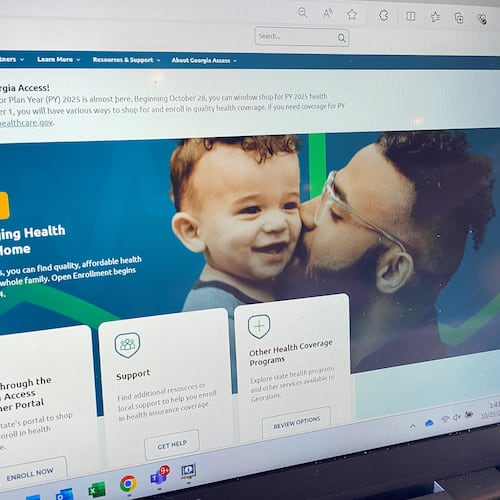On a sweltering Tuesday afternoon as temperatures surpassed 90 degrees, a group of longtime Fourth Ward residents gathered on Albert Cooper IV’s porch to share memories of their century-old neighbor — the Atlanta Medical Center.
Both of Cooper’s daughters were born in the hospital right down the street, then known as Georgia Baptist. Charles Blackmon used to visit some of the hundreds of doctors’ offices on the property with his wife, who suffered from sickle cell anemia. Joyce Sheats remembered one of her best friends who had a severe stroke rushed to its high-tech neurology unit from Kennesaw.
“I’m concerned about where people are going to go — and where they’re going now,” said Sheats, a former nurse and researcher at Morehouse School of Medicine who has lived in the neighborhood all of her 74 years.
“Everybody can’t keep going to Grady,” she said. “People need a medical home.”
Even as the group mulled the site’s past, its future is taking shape.
Credit: HYOSUB SHIN / AJC
Credit: HYOSUB SHIN / AJC
On Monday, community leaders will join the CEO of Wellstar Health System, which still owns the land, for a ceremony marking the beginning of major demolition. With them will be the development company that’s been hired to help figure out what to build next.
Once at odds, the mayor and Wellstar CEO Candice Saunders now say they are allied in the mission to build a development that will newly anchor the community, this time around housing, retail and green space.
People associated with the project say they are going above and beyond to make sure even the demolition is done with minimal nuisance and risk to the public. And among the workers will be 10 new hires from the neighborhood itself who are now trained in demolition work.
Two things Wellstar and the developer, Integral Group, promise: The community’s input will be considered, and what’s to come will have some sort of health care element.
“This redevelopment is about much more than buildings,” Integral Group Chairman Egbert Perry said in a news statement earlier this year when his company was chosen. “It’s about revitalizing a community with empathy and foresight.”
Few developments have faced the community scrutiny this one does.
Across the street from the empty facility, Rocky Das, manager of the Food Mart and Exxon gas station, said foot traffic to his store plummeted after the hospital closed. He said he’s thrilled about the idea of condos, more aesthetic development and retail right next door.
“It’s 100% good, absolutely good to have,” he said. “It’s good for the community to ‘grow up.’ I’m excited.”
Credit: HYOSUB SHIN / AJC
Credit: HYOSUB SHIN / AJC
Transforming a loss
Community members, elected officials and even hospital staff were left in shock when the doors of Atlanta Medical Center were locked for good at midnight Nov. 1, 2022.
“I think we’re all hurt by losing a 121-year-old institution because some corporation couldn’t handle it,” said Cooper, 75, who calls himself an ombudsman for the community.
Wellstar Health System purchased AMC in 2016 as part of a group of five hospitals. AMC and a hospital in East Point were less attractive, but they were locked in a package deal.
By 2022, the pandemic was piling extra financial strain on hospitals and, as bad or worse, causing a severe shortage of health workers nationwide.
That year, citing financial strain and patients who visited the ER when they needed only a clinic, Wellstar announced the closure of both AMC and AMC-South, the East Point facility. It said it had tried millions in investment to no avail.
Credit: Miguel Martinez
Credit: Miguel Martinez
Other Atlanta hospitals were swamped with a new wave of patients.
About 1,700 downtown Atlanta jobs vanished, from doctors and nurses to janitors and cafeteria workers. Cobb County-based Wellstar asked the doctors and other medical professionals to come to jobs at its other hospitals, usually in distant suburbs. Lower-level workers, especially those without a car, often found themselves looking for work.
Local businesses took a hit.
Credit: arvin.temkar@ajc.com
Credit: arvin.temkar@ajc.com
Dickens was outspoken in his disappointment with the decision to close, slamming the health care provider for what, at the time, he called the “nuclear option.”
The building sat untouched for three more years as the city levied multiple moratoriums on development of the 22-acre site.
Demolition is expected to take several months, with officials saying it will be surgical rather than primarily implosions, to limit debris and dust.
Afterward, the site is to be transformed into a community hub with parks, housing, retail shops and office space. The developer also wants the city to pitch in by improving roads and other public infrastructure around the site.
But specific medical facilities — like new primary care offices or urgent care — are glaringly absent from the plan so far.
“People need health care, and we don’t have enough of it,” Dickens said. “Throughout this process, we’ve been actively trying to get another hospital — we did all we could to try to keep Wellstar there, but of course, they left.”
Credit: HYOSUB SHIN / AJC
Credit: HYOSUB SHIN / AJC
Forrest Coley, chair of the area’s local neighborhood planning unit, said Integral hosted a number of planning meetings with the community. Residents echoed the same desire for health care facilities, he said.
“Doing it in phases, creating mixed-use, creating retail, creating residential, including affordable housing, creating green space — all of that,” he said. “A lot of people said: ‘We need to have some type of health care.’”
Credit: Steve Schaefer
Credit: Steve Schaefer
A century of service
The former medical center is within the historically Black Fourth Ward — rebranded as the Old Fourth Ward when political maps shifted in the mid-1900s — where about one-third of the population lives in poverty.
The hospital began Thanksgiving Day 1901 as a small, faith-based infirmary dreamed up by Baptist pastor and preacher Len G. Broughton, according to a history by Didi Murphy. It first opened downtown on Courtland Street, then moved to Luckie Street.
In 1917, the Georgia Baptist Convention took over the facility and raised the funds to rebuild it at the current location on Boulevard, and Georgia Baptist Hospital was constructed in the 1920s.
The Baptist Convention sold the hospital to the for-profit Tenet Healthcare, which then sold to Wellstar two decades later.
Sheats said despite the constant growth of the city, the Atlanta Medical Center felt like an anchor in the community.
“Sometimes you don’t miss things until they’re gone,” she said.
Credit: LBGPF2-004c, Lane Brothers Commercial Photographers Photographic Collection, 1920-1976. Photographic Collection, Special Collections and Archives, Georgia State University Library.
Credit: LBGPF2-004c, Lane Brothers Commercial Photographers Photographic Collection, 1920-1976. Photographic Collection, Special Collections and Archives, Georgia State University Library.
Dickens said the loss still hurts three years later.
“We were very caught off guard that the hospital was closing when Wellstar decided to pull out,” Dickens told The Atlanta Journal-Constitution. “No one was happy about that decision, and now the city of Atlanta is under-hospitaled.”
Dr. Mark Waterman, former ER doctor and president of the medical staff at the shuttered hospital, said the medical community had to work quickly to accommodate a new pool of patients that were left without care after closure.
“The medical community has adapted to AMC being gone — Grady has picked up so much, and Emory Midtown has picked up so much,” he said. “Grady is still the only trauma center inside of I-285, so they get all that business.”
Following the medical center’s closure, lawmakers funneled additional dollars toward the city’s remaining hospitals.
Gov. Brian Kemp used some of Georgia’s federal pandemic funds for a one-time allocation to Grady of $130 million.
DeKalb County chipped in as well: $20 million for increased services at both Grady and Emory Hillandale Hospital. Fulton County put more than $40 million toward expanding service at Grady’s flagship hospital and new clinics, including a freestanding ER, in south Fulton.
Credit: Olivia Bowdoin
Credit: Olivia Bowdoin
But emergency room care in the Fourth Ward is critical, Waterman said, since the downtown bordering neighborhood doesn’t offer much room for primary care offices.
“That was essential because, like many communities, it doesn’t breed the environment for someone to open an office and practice primary care,” he said.
Until then, Waterman said he suspects the city’s emergency services will still be overburdened by uninsured patients with nowhere else to turn.
“Access to care for that community in downtown Atlanta is still going to be difficult because there aren’t — other than Grady — resources available for that patient population,” he said. “So, they do tend to over utilize the 911 system and will continue until there are other avenues for them to go to.”
Credit: HYOSUB SHIN / AJC
Credit: HYOSUB SHIN / AJC
New development brings mixed emotions
Longtime residents, who have waited years for investment in the community, now also fear the new development might lead to gentrification and push them out of their homes.
“I’m going to leave my house when they carry me out — you don’t always get to do that,” said Blackmon, who purchased his home in 1978. “There (should) be some place for residents to go, that’s cost effective, because no one wants to leave the neighborhood.”
Dickens — who has made lofty goals of boosting the city’s affordable housing stock — agreed the area’s longest-tenured residents shouldn’t be left behind.
“To go from a hospital to luxury and not include the (neighborhood) people would not be something that we want to see,” he said.
Statements from Integral and Wellstar so far suggest they hope the development can do both.
Their plan will be “strategically designed to meet the needs of the community while fostering economic growth and sustainability.”
Credit: Jamie Spaar
Credit: Jamie Spaar
The city’s initial proposal suggested up to 2.4 million square feet of residential units, 120,000 square feet of commercial and retail shops, and 240,000 square feet of office space. The redevelopment could also connect walkers to Freedom Park Trail, Old Fourth Ward Park and the east side of the Beltline.
In press materials, Integral Chairman Perry speaks of “re-knitting the city.” The company says, “It’s about restoring connections across neighborhoods, elevating civic health, and honoring the legacy of vital institution while building something stronger in its place.”
For many, the massive redevelopment of the site also brings hope of a new chapter for the often-overlooked area of the city.
Tom Boyle, president of the Old Fourth Ward Neighborhood Association, called the demolition on Monday “the beginning of the beginning.”
“The Old Fourth Ward is Atlanta’s third largest neighborhood and, in my opinion, the most iconic in terms of the history and the diversity,” Boyle said. “It’s a hugely important site, so there’s a real opportunity here to get it done and get it done right.”
Keep Reading
The Latest
Featured











